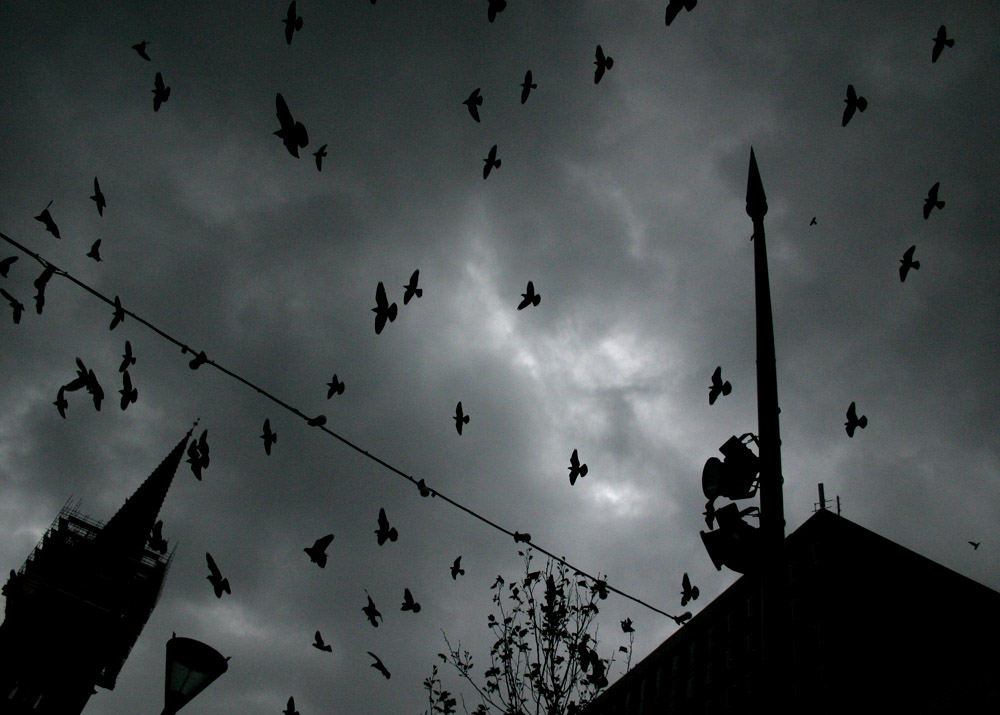First, then, I want to analyze my thoughts on other people's thoughts. To accomplish this, I randomly selected from Rio's list of people conveniently located on his blog.
And thus, we begin with the wizard Merlin. Is it not fascinating how we try to rationalize everything? Even when we break "out of the 'so-called' box", there is a sense that we need to rationalize things. I need to explain that I am seeing something; that, having seen it a million times before, I haven't really seen it. I rationalize the moment into a new, profound, transcendence of a previous consciousness. But I am now conscious of this, am I not?
 I like your title, "The Sublime in the Mundane". It is fascinating that those things which we care not to rationalize, the mundane, can capture us and, by failing to be explained, considered, and rationalized, they become sublime. It is the classic Biblical paradox: he that is in a high position should take joy in his low position. He that is in a low position should take joy in his high position. The first will be last, the last first. The greatest are the least, the least the greatest.
I like your title, "The Sublime in the Mundane". It is fascinating that those things which we care not to rationalize, the mundane, can capture us and, by failing to be explained, considered, and rationalized, they become sublime. It is the classic Biblical paradox: he that is in a high position should take joy in his low position. He that is in a low position should take joy in his high position. The first will be last, the last first. The greatest are the least, the least the greatest.What to make of all this?
Exposed here is the truth of humility. It is as your philosopher says: "I feel that the universe of being is too vast to be comprehended." Truth.
Often there is a sense of urgency; we need to act, to move, to swerve, as it were. But for me, the key is to be still, to accept that I am nothing.
Yet, in this insufficiency, I am unsettled. And again I feel the need to move, to swerve. I need to change things, to make myself better, to dream in an American fashion. What happens in the stillness, when rationale is dismissed and I simply am? The famous "I think, therefore I am" suggests that to cease the act of thinking, of rationalizing and considering, is to cease to exist. But I would argue this is such a small view. To assume that I am the center of the universe, that my acting and thinking vastly transforms my place the multitude of otherness, of things beyond me, is to assume that I am much and, therefore, to become aware of the fact that I am not much.
The last part of Sunday Morning is fascinating, and an appropriate conclusion.
 She hears, upon that water without sound,
She hears, upon that water without sound,A voice that cries, 'The tomb in Palestine
Is not the porch of spirits lingering.
It is the grave of Jesus, where he lay.'
We live in an old chaos of the sun,
Or old dependency of day and night,
Or island solitude, unsponsored, free,
Of that wide water, inescapable.
Deer walk upon our mountains, and the quail
Whistle about us their spontaneous cries;
Sweet berries ripen in the wilderness;
And, in the isolation of the sky,
At evening, casual flocks of pigeons make
Ambiguous undulations as they sink,
Downward to darkness, on extended wings.
For us, the part about Jesus will give pause. Where he still "lay", or where he once "lay"? What could it be!?! Yet Stevens reveals that we are obsessed with rationalizing an irrational thing, and draws our attention to the deer, the quail, even the berries, as they continue on in those things which first set them in motion. But not the man. He has paused because he has dared to think, to ask, and to wonder. These, though, are acts. They involve movement, information transfer, shiftings in consideration. So has he paused for another reason? Will he truly pause?
The pigeons "make/Ambiguous undulations as they sink,/Downward to darkness on extended wings." The pigeon knows not where it goes, but it carries on, casually and ambiguously. Why has the pigeon's willingness to be taken him to the void, the emptiness, the darkness? Have we reached the point at which logic and rationale must begin, at the edge of the darkness? Have we found a necessity for such things? I am sure we have, yet here, where I close and where we must cease to attempt to fully understand, the lines between knowledge and wisdom, or understanding, are drawn. To return to our starting point, it is one thing to see, and an entirely different thing to see. In the end of the poem, the woman looks beyond herself and, for the first time, sees the greater universe. She longs for eternity, but she cannot have it. And why is that? I would say because she continues to act, to think, to strive in vain from a self-centered view.
She must look beyond the self. And here, here she must pause. For when she arrives, for the first time, she will be confronted with the reality of something so far beyond herself, that the mind ceases to rationalize and the sublime, a wisdom and understanding transcendent of fully knowing, manifests in the void.
She must look beyond the self. And here, here she must pause. For when she arrives, for the first time, she will be confronted with the reality of something so far beyond herself, that the mind ceases to rationalize and the sublime, a wisdom and understanding transcendent of fully knowing, manifests in the void.
Well, thanks for the comments about my blog Cameron. It seems we have many similar ideas about how one reaches the sublime. Less mind, more awareness. Such a fine distinction but one that seems cannot be expressed enough. The power of imagination is what separates the poet from the philosopher. Imagination with reason. Creation with Emptiness. We can't look at the world and make sense out of it without both facets. If we think of the creative process that a poet like Stevens goes through, where does this imagery and beauty come from? Is this his memory reoccuring, or is it a new event? I really like Part III of "Like Decorations in a Nigger Cemetary." It goes, "It was when the trees were lifeless first in November/And their blackness became apparent, that one first/Knew the eccentric to be the base of design." To understand the beauty we must first have a a sense of the world without it? We can only see the beauty when there is a lack of it elsewhere.
ReplyDelete